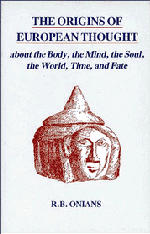Book contents
- Frontmatter
- Contents
- Preface to the first edition
- Preface to the second edition
- Introduction: The Earliest Greeks
- PART I THE MIND AND THE BODY
- PART II THE IMMORTAL SOUL AND THE BODY
- PART III FATE AND TIME
- Chapter I ‘On the Knees of the Gods’
- Chapter II Πείρατα
- Chapter III Καιρός
- Chapter IV The Weaving of Fate
- Chapter V Other Peoples—Fate and Magic
- Chapter VI Μοῖραν ἐπιτιθέναι, πεπρωμένος, etc.
- Chapter VII ʿΥπὲρ μόρον and the Relation of the Gods of Fate
- Chapter VIII The Jars of Zeus, the Scates of Zeus, and the Κῆρες
- Chapter IX Time—Ἦμαρ
- Chapter X Lachesis, Klotho, and Atropos
- Chapter XI Phases of Body and Mind, Sorrow, Sleep, Death, etc.
- Chapter XII Τέλος
- ADDENDA
- Indexes
Chapter VII - ʿΥπὲρ μόρον and the Relation of the Gods of Fate
Published online by Cambridge University Press: 06 August 2010
- Frontmatter
- Contents
- Preface to the first edition
- Preface to the second edition
- Introduction: The Earliest Greeks
- PART I THE MIND AND THE BODY
- PART II THE IMMORTAL SOUL AND THE BODY
- PART III FATE AND TIME
- Chapter I ‘On the Knees of the Gods’
- Chapter II Πείρατα
- Chapter III Καιρός
- Chapter IV The Weaving of Fate
- Chapter V Other Peoples—Fate and Magic
- Chapter VI Μοῖραν ἐπιτιθέναι, πεπρωμένος, etc.
- Chapter VII ʿΥπὲρ μόρον and the Relation of the Gods of Fate
- Chapter VIII The Jars of Zeus, the Scates of Zeus, and the Κῆρες
- Chapter IX Time—Ἦμαρ
- Chapter X Lachesis, Klotho, and Atropos
- Chapter XI Phases of Body and Mind, Sorrow, Sleep, Death, etc.
- Chapter XII Τέλος
- ADDENDA
- Indexes
Summary
This reinterpretation of πέπρωται, particularly in Il. XVI, 440–3 and XXII, 178–81, will help to a better understanding of the much disputed relationship of the gods to fate, the problems whether the gods are subordinate to fate or fate to the gods, and of the supposed violation of fate. We see that the gods, above all Zeus, spin and bind fate. Physically Zeus is irresistible and what he has bound he can unbind. But it is essential to the conception that the allotment once made be respected. There is a moral sanction intrinsic in it. αἶσα is the expression of an ordered world, ‘measure’ that should be observed. ὑπὲρ αἶσαν means not only ‘beyond the measure allotted’, ‘beyond what is fated’, but also ‘beyond measure’ (῞Εκτορ, ἐπεί με κατʾ αἶσαν ἐνείκεσας οὐδʾ ὑπὲρ αἶσαν, etc.), and αἴσιμος ‘proper, right’ as well as ‘fated’. Allotting is like promising; once done, one must stand by it. We may compare Zeus' statement:
οὐ γὰρ ἐμὸν παλινάγρετον οὐδʾ ἀπατηλὸν
οὐδʾ ἀτελεύτητον, ὄ τί κεν κεϕαλῇ κατανεύσω.
Otherwise the validity of allotment and the order it implies disappear. Thus it is that Zeus is restrained. He cannot ‘play fast and loose’. It is not that there is a stronger external deity. The society of the gods morally supports the established order and they actively intervene in human affairs to see that the measure which Zeus has allotted is fulfilled.
- Type
- Chapter
- Information
- The Origins of European ThoughtAbout the Body, the Mind, the Soul, the World, Time and Fate, pp. 390 - 394Publisher: Cambridge University PressPrint publication year: 1988



